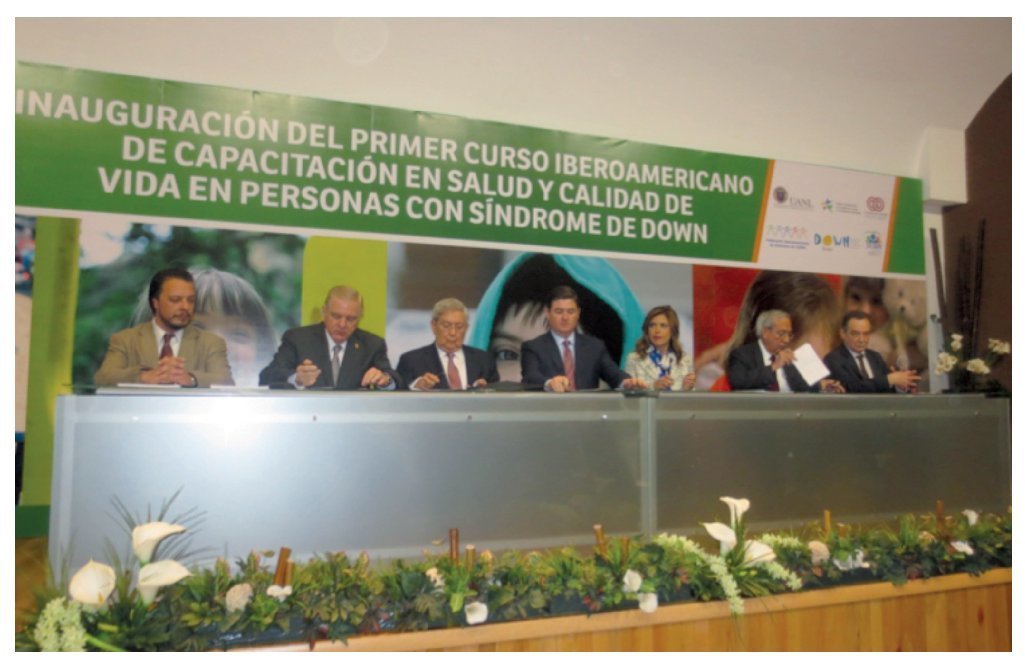Fortunately, and deservedly so, there is a frequent and increasing presence of individuals with Down’s syndrome in all walks of life. The effectiveness of the treatment of their health problems, the improved use of their abilities, the prolongation of their active life, and the breaking of old taboos, has made this possible. But, it is essential that these advances continue progressing, in order to achieve a better quality of life, and that the health care that has made this possible is universalized. For this reason, the initiatives mentioned here are welcome and necessary.
Under the title heading of this Editorial, there was a vocational training course held in Monterey between 18 February and 7 March 2015, directed at medical and paramedical personnel of the State of Nuevo León (México), with the main purpose of providing the preparation and skills for the subsequent training of other professionals. Around 85 children are born with Down’s syndrome each year in Nuevo León, and they are expected to benefit from improved detection and earlier care, early access to the appropriate treatments, respect for their human rights and, in short, a longer good quality of life.
The event was organized by the Ibero-American Down’s Syndrome Federation (FIADOWN), moderated by the renowned Jesús Coronado, and attached to the Instituto Iberoamericano de Investigación y Apoyo a la Discapacidad Intelectual (Ibero-American Institute for Research and Support of Intellectual Disability), created in February 2012, national in scope and its main office in the city of Monterrey. These Institutions were created to “promote and strengthen the human rights culture, and establish and maintain close links with the various Federations and Associations in the different Ibero-American countries” that strive for the same principles. Among these is “Down España”, and, in turn, with the participation and support of the Societies that make up its Federation.
Inaugural Table of the “First Ibero-American Course on Training in Health and Quality of Life in Individuals with Down’s Syndrome”.
The course was held in the Research and Development Centre in Health Sciences (Centro de Investigaciones y Desarrollo en Ciencias de la Salud) of the Autonomous University of Nuevo León (UANL) and was mainly directed at 900 Primary Care Physicians from all over the State, providing them with the knowledge that they subsequently had to disseminate to the rest of the health sector personnel of the territory. It was inaugurated by the State Governor, Mr. Rodrigo Medina, accompanied at the head table by the highest state authorities of the Departments of Health and Social Well-Being (Departamentos de Salud y Bienestar Social).
It was run by 20 professionals with wide experience in the medical and psychosocial problems inherent to the syndrome, updating knowledge and approaching it from the perspective of their respective specialties, dedicating 3 full days per week. Almost all the teaching staff that accompanied Dr. José María Borrel, Medical Assessor of Down España, came from Spanish institutions dedicated to Down’s syndrome. It was a pleasure for the Centro Médico Down, of the Fundación Catalana Síndrome de Down, which had the most numerous representatives, together with members of Madrid, Valencia, Málaga, Granada, Huesca and Buenos Aires Associations.
The invaluable contribution of its Executive Director, Dr. María Agustina Garza, to the success of the project must be mentioned here, who with her enthusiasm and availability brought her great organizational capacity to the attention of the participants.
We should be welcomed for putting into practice initiatives such as those of this course and hope that future courses can expand and establish the lessons that were taught during it.





